The iPhone 6 Review
by Joshua Ho, Brandon Chester, Chris Heinonen & Ryan Smith on September 30, 2014 8:01 AM EST- Posted in
- Smartphones
- Apple
- Mobile
- iPhone 6
GPU Performance
While we don't quite have real games to benchmark against, we do have benchmarks that are reasonably good approximations of games, which heavily stress the GPU. For the most part, this means that we can see the performance of the A8's PowerVR GX6450 GPU but there are some aspects that are CPU-bound, which we'll discuss after the results.
Edit: Before I get into the results, I must caution that Basemark X will have inaccurate on-screen results as the benchmark was made using XCode 5.x in order to keep scores comparable between versions 1.1 and 1.1.1. This doesn't affect the overall score, which is solely calculated based upon off-screen performance.
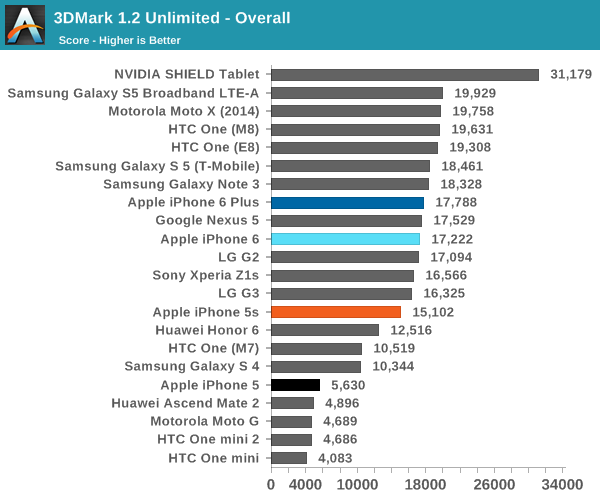
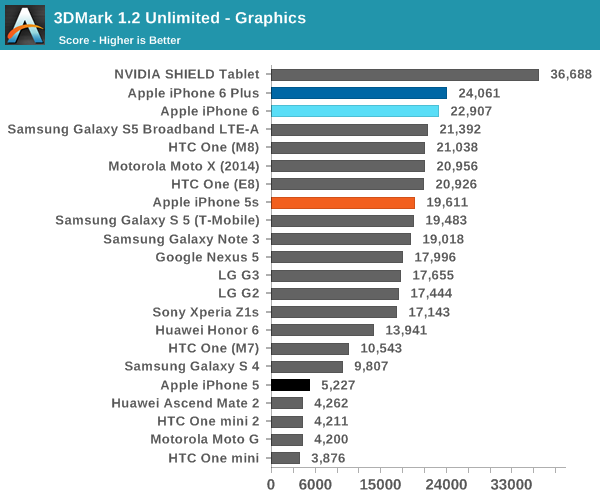
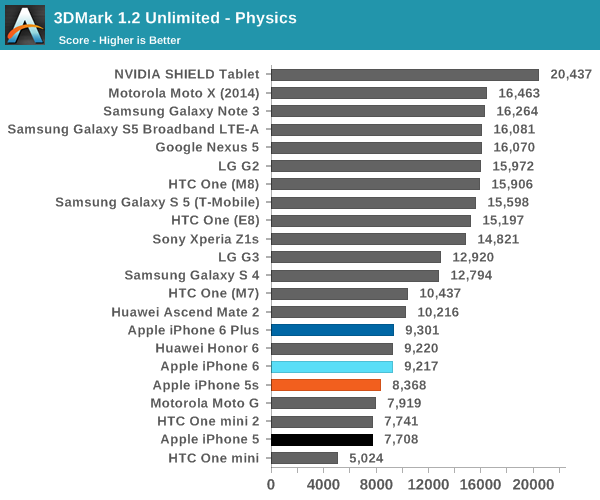
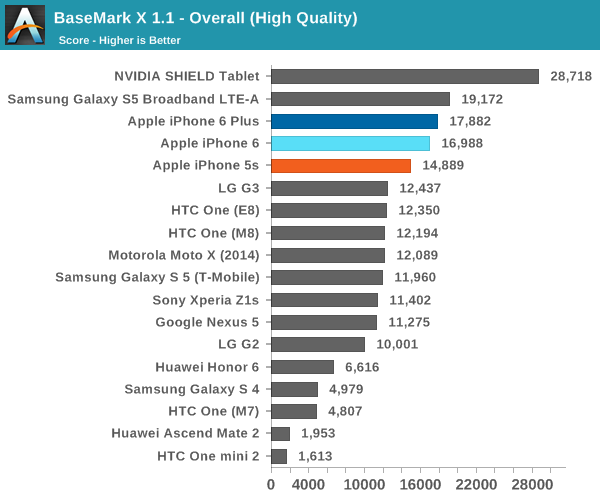
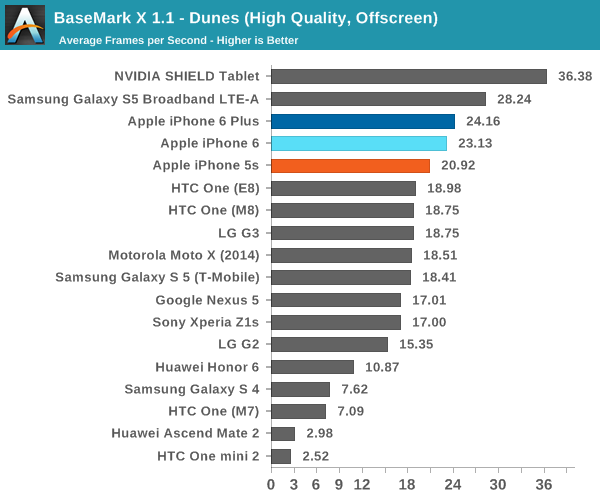
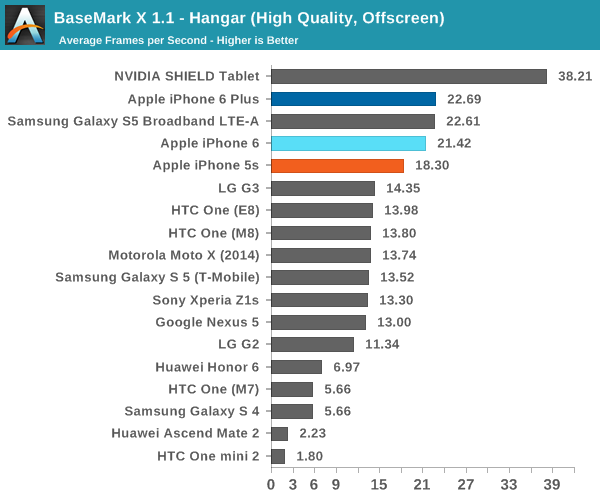
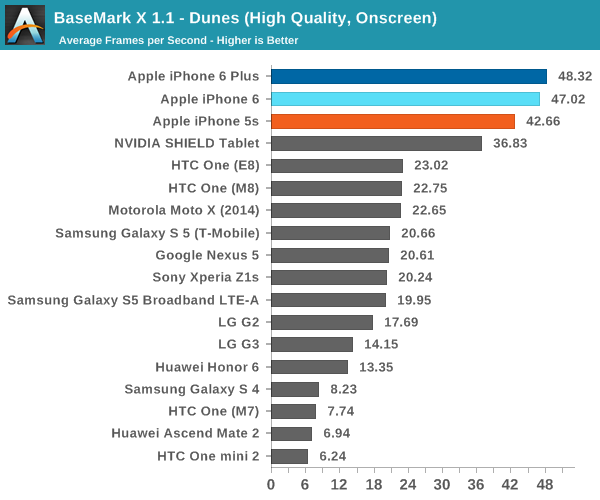
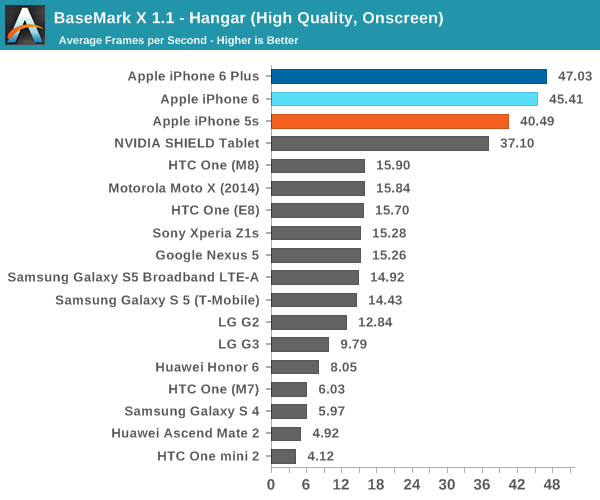
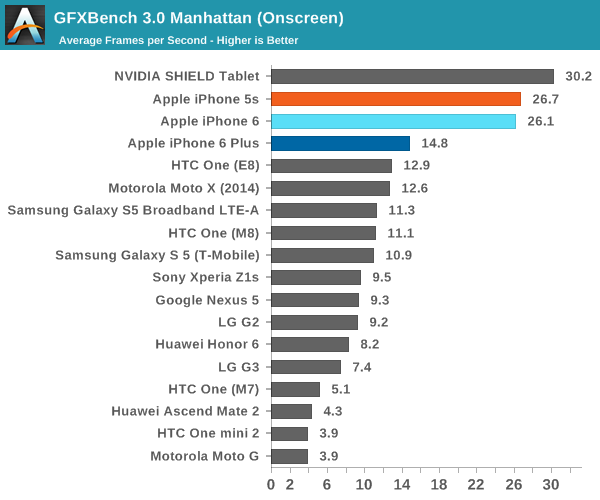
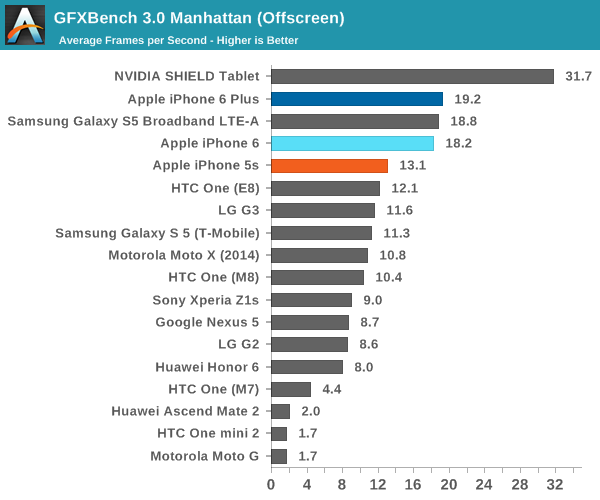
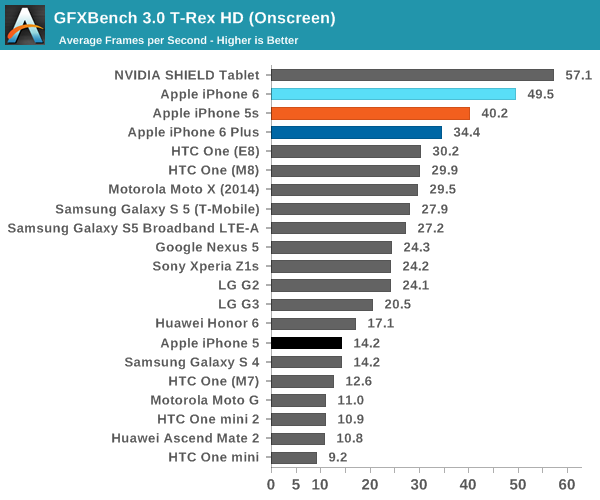
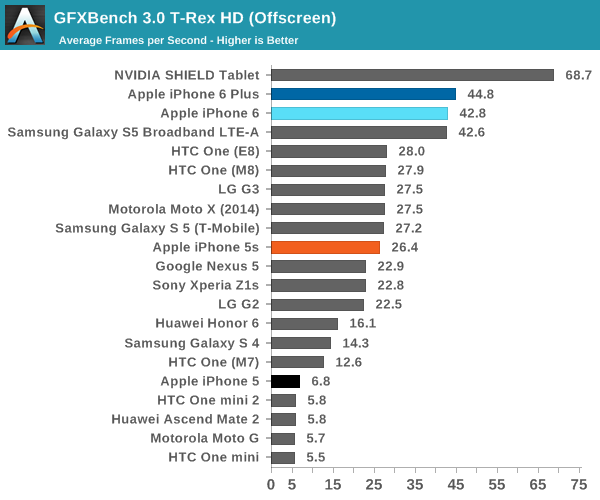
For the most part, we see that the GX6450 is at about the same level as Qualcomm's Adreno 420, which seems to track closely to expectations given that the A7's GPU was around the same performance as the Adreno 330. The 3DMark test does have an interesting result, but it seems that this is because 3DMark's physics test has a strong amount of data dependency that restricts the level of out of order execution that can be done. NVIDIA's Tegra K1 is the current leader in graphics performance, but of course it's also in a tablet instead of a smartphone so it's not a direct competitor.
NAND Performance
As we move towards the goal of seamless performance in everyday tasks, one significant factor is IO performance. While there's definitely a minimum level of performance that allows for generally acceptable smoothness, there's value in having higher storage performance (e.g. prevent bottlenecking in situations such as updating apps in the background). In order to test this, we use Androbench with some custom settings on Android and a custom utility developed by Eric Patno for iOS, who has been quite helpful with furthering our efforts to test storage performance.
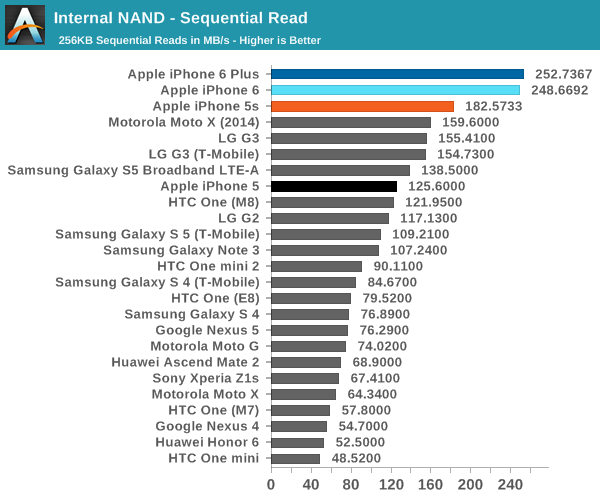
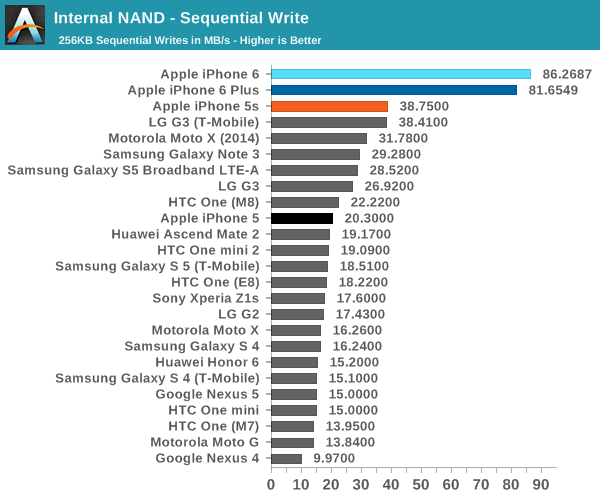
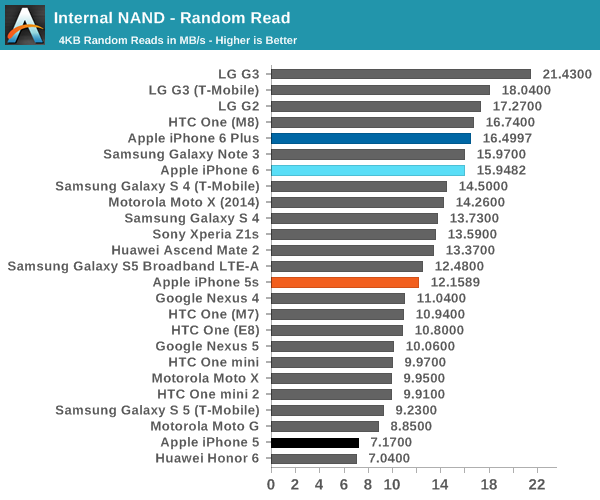
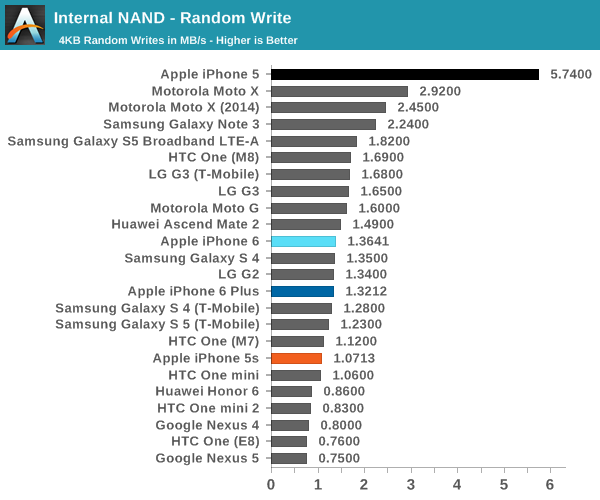
As this is the first time that we've looked into NAND performance on iOS devices, it's definitely worth scrutinizing the data a bit more closely than in most cases. There are a few notable cases here, which are the class-leading speeds for sequential reads and writes on the iPhone 6, but also the rather middling random read and write speeds for the iPhone 6 and 5s. The oddest result is definitely the iPhone 5, which is Ryan's personal unit and while the random read speeds are on the low side, random write speeds are easily record-setting.
In practice, with tablets and smartphones being less multitasking heavy than PCs/laptops, the sequential scores are probably slightly more relevant to the overall user experience. The iPhone 6 results show a significant increase in performance over the iPhone 5s in all of the tests, which is always good to see.










531 Comments
View All Comments
Morawka - Tuesday, September 30, 2014 - link
mods please clean this junk up. I don't want to see anandtech ruined by people like this. it's like the floodgates just opened and all the gremlins got in.Aengland818 - Wednesday, October 1, 2014 - link
Your blind hatred for someone with an opposing opinion is something worth examining. Why would you use such offensive language? What does it accomplish other than to make you look like a defensive, homophobic jerk!Kidster3001 - Thursday, October 2, 2014 - link
said the Pot to the Kettle...akdj - Friday, October 3, 2014 - link
Harsh language. Necessary?I think you've shown your IQ level. You're ignorant dude. Thank your computer for anonymity. Peeps like you aren't welcome in today's society
sonicmerlin - Tuesday, September 30, 2014 - link
Uh, the power cost of constantly digging into the NAND flash page files because of a lack of RAM is far more than an extra gig of RAM. In reality power consumption by adding more RAM is almost negligible, and in general RAM consumes only a tiny fraction of overall power to begin with.name99 - Tuesday, September 30, 2014 - link
"In reality power consumption by adding more RAM is almost negligible, and in general RAM consumes only a tiny fraction of overall power to begin with." Numbers? Proof?The article http://arxiv.org/pdf/1401.4655.pdf states that running a variety of SPEC2K programs on a Galaxy S2, RAM power and CPU power are more or less equivalent --- for some programs CPU power usage is higher, for some RAM power usage is higher.
This doesn't COMPLETELY answer the question, partly because that's older technology, partly because a large part of the issue is not how much power RAM uses when active but rather how much it uses when idle. Nonetheless it's a real data point suggesting that RAM is not free in terms of power, which is more than you're providing.
It's also worth pointing out that before the OS will be "constantly digging into the NAND flash page files"
(a) there is no paging file in iOS. There will be demand paging IN (most notably for instruction pages, probably also for at least some resource files that are marked read-only) and a small amount of paging OUT (as far as I can tell, the result of mmap'd filed) but there is no paging file.
(b) remember that iOS (like Mavericks) provides compressed RAM which, at least for the Mavericks experience, provides the equivalent of about 50% more RAM across a wide variety of usage scenarios. On iOS there is almost certainly dedicated HW performing the compression/decompression, which means low power and which may mean the usage of more aggressive algorithms than are possible on x86, providing even better compression ratios. This compression mechanism will kick in before pages are discarded (even read-only pages) which will further reduce the need to reload from flash.
I agree that the tabs situation for Safari is not ideal. However in real life, it is not a problem I actually ever encounter on my iPhone 5 (in Safari or otherwise). It's much more of a problem for iPad, and THERE I think Apple will really be screwing over its customers if it sticks with 1GB. On iPhone, I think this remains a theoretical, not a real problem. We can all invent stories about how it limits the future use of iOS 11, but that's pure guessing; it simply is not a real problem today for most users.
Kidster3001 - Thursday, October 2, 2014 - link
iPhones haven't need more memory for several reasons. 1. Android apps run in a VM. 2. Android can actively multi-task. 3. Android cannot be as highly customized (pared down) because it has to support more hardware. 4. More, more more.NEEDING the extra memory is a negative. HAVING it is not necessarily a negative. Battery life is what matters. I'll put my Android phone against any iPhone for battery life.
And seriously... "so lazy people don't have to close tabs". That like saying "I wish my OS was like DOS so I didn't have to close all these other Windows to do different things". It's not a good argument.
mrochester - Tuesday, September 30, 2014 - link
It's a win for Apple, and neither a win or a lose for customers. The iPhone is still the best smartphone on the market, even with 1GB of RAM, so what is pushing that to 2GB going to achieve other than simply cutting into Apple's profit margin? Us customers aren't going to get anything from it.mrochester - Tuesday, September 30, 2014 - link
Or is it that in your mind, Apple has some sort of moral obligation to put as much hardware in their devices as possible so as to justify their profit margin, even if it has no effect on the end user experience of the device. You essentially just want to know that the hardware is there for the sake of it and that Apple hasn't made quite so much money from your purchase?danbob999 - Tuesday, September 30, 2014 - link
Apple has no moral obligations.To be taken seriously, we could say that users have a moral obligation not to say that Samsung devices are cheap when they are in fact more expensive to make than iPhones.